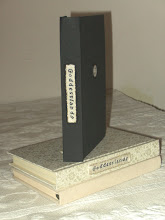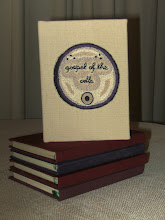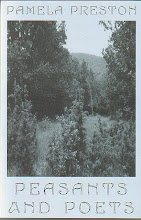AUTUMN EQUINOX
Questioner: Thanks for meeting with me again.
Marianne: My pleasure.
Q: Rumor has it you performed a ritual in the woods September 22, the autumn equinox? And it had something to do with the novel, Peasants and Poets?
M: Yes, The idea of burying the story of 2000 years of metempsychosis in a hidden hamlet in the Pyrenees was born years ago when reading the first pages of I Claudius. It was the reason we returned to the forests of the Pyrenees.
Q: Do you mean to say you buried a book?
M: Yes, with the hope, albeit a metaphor, that the story might be unearthed in another 2000 years.
Q: This may return us to your bizarre conceptions of publishing.
M: Of course! Burying the legend of the last peasants and poets in the circle of stones in the woods—the central motif of the novel—for a readership in the distant future, is the way of targeting our market.
Q: Uhh…target-marketing projecting 2000 years from now?
M: Because in that time, and perhaps it might be unearthed 300 years from now, or 1000 years from now, we foresee a historic value in the story of the last death pangs of the European peasant culture. We also believe at that time there will be a genuine curiosity about how and by whom the first poem was written. We consider this a revelation—that the poetic impulse began in the forest-universities of ancient Ireland.
Q: I can see why there is not a collective interest in these themes at present.
M: Well, we sincerely hope that the soul of posterity shall have a need for mythmaking, scholarship, and reflection on the vast philosophical, mythological, and poetical memory. As it applies to Self, I might add. That is to say, no matter how our current technological culture may avoid it, the history of civilization exists within each individual and, therefore, the collective unconscious. So yes, of course, we published an edition of one for posterity yesterday. All for one, one for all!
Q: May I ask what your packaging techniques were?
M: We shrouded the book with many layers of materials – contemporary bubble wrap, then aluminum foil; all this swathed in an ancient cloth, then into an antique tin box sealed with super glue. We buried it deeply between the roots, rocks and the decomposing bones of the forest creatures. It is up to the earth now how well the packaging works.
Questioner: Thanks for meeting with me again.
Marianne: My pleasure.
Q: Rumor has it you performed a ritual in the woods September 22, the autumn equinox? And it had something to do with the novel, Peasants and Poets?
M: Yes, The idea of burying the story of 2000 years of metempsychosis in a hidden hamlet in the Pyrenees was born years ago when reading the first pages of I Claudius. It was the reason we returned to the forests of the Pyrenees.
Q: Do you mean to say you buried a book?
M: Yes, with the hope, albeit a metaphor, that the story might be unearthed in another 2000 years.
Q: This may return us to your bizarre conceptions of publishing.
M: Of course! Burying the legend of the last peasants and poets in the circle of stones in the woods—the central motif of the novel—for a readership in the distant future, is the way of targeting our market.
Q: Uhh…target-marketing projecting 2000 years from now?
M: Because in that time, and perhaps it might be unearthed 300 years from now, or 1000 years from now, we foresee a historic value in the story of the last death pangs of the European peasant culture. We also believe at that time there will be a genuine curiosity about how and by whom the first poem was written. We consider this a revelation—that the poetic impulse began in the forest-universities of ancient Ireland.
Q: I can see why there is not a collective interest in these themes at present.
M: Well, we sincerely hope that the soul of posterity shall have a need for mythmaking, scholarship, and reflection on the vast philosophical, mythological, and poetical memory. As it applies to Self, I might add. That is to say, no matter how our current technological culture may avoid it, the history of civilization exists within each individual and, therefore, the collective unconscious. So yes, of course, we published an edition of one for posterity yesterday. All for one, one for all!
Q: May I ask what your packaging techniques were?
M: We shrouded the book with many layers of materials – contemporary bubble wrap, then aluminum foil; all this swathed in an ancient cloth, then into an antique tin box sealed with super glue. We buried it deeply between the roots, rocks and the decomposing bones of the forest creatures. It is up to the earth now how well the packaging works.
Q: I have to say, coming from the perspective of an intensely savvy technological world, this seems, well…weird.
M: No weirder than the changes we have observed in this hamlet—microcosmic of the world, needless to say. It is all in the book. We didn’t think we would be returning, but we knew the ritual had to be performed. An epilogue, per se.
Q: I noticed that the novel ends at summer solstice, 2007— and that there is no epilogue to the story.
M: The last eight months here has been the living epilogue to Peasants and Poets, consummated by the Equinox ritual.
Q: So what did you experience during this 8-month Epilogue?
M: It is still in progress. We only performed the ritual a few days ago, more will be revealed in the next few months. I will say, however, that the peasants have sold all their properties now. I counted 13 cars in the square this weekend. In fact, the ritual yesterday was a sad one.
Q: What do you mean by that?
M: It consummated the end of one way of life here and symbolized the surrender of that life into the earth. I mean, while digging the burial pit, one felt that the ruination of the old ways and the land had come, even to paradise. And it is sad to find ones self in the reality of a ruin.
Q: I guess that brings us full circle to the photo of the location of Marianne Press?
M: Yes, and we will press forward from the ruin. We have come to learn that life is paradox – light comes from darkness. Dark and light must exist together to be alive. So, though a ruin may signify death by marauders, siege, or fire--or even the cruelty of Nature’s erosion--the end is really a beginning. Light will emerge from darkness. There is a poem contained in Gospel of the Cells that we believe expresses the nature of change–its grief and its hope.
Q: I am curious to your allusions of we. Who are the others?
M: I am afraid we will have to reserve that answer for another interview.
Q: Then, may I ask, who is the poet of your very small press?
M: The answer to that lives in the written words, though she receives inspiration from me.
Q: I don’t understand…
M: I’d like to leave it at that. Or this:
M: No weirder than the changes we have observed in this hamlet—microcosmic of the world, needless to say. It is all in the book. We didn’t think we would be returning, but we knew the ritual had to be performed. An epilogue, per se.
Q: I noticed that the novel ends at summer solstice, 2007— and that there is no epilogue to the story.
M: The last eight months here has been the living epilogue to Peasants and Poets, consummated by the Equinox ritual.
Q: So what did you experience during this 8-month Epilogue?
M: It is still in progress. We only performed the ritual a few days ago, more will be revealed in the next few months. I will say, however, that the peasants have sold all their properties now. I counted 13 cars in the square this weekend. In fact, the ritual yesterday was a sad one.
Q: What do you mean by that?
M: It consummated the end of one way of life here and symbolized the surrender of that life into the earth. I mean, while digging the burial pit, one felt that the ruination of the old ways and the land had come, even to paradise. And it is sad to find ones self in the reality of a ruin.
Q: I guess that brings us full circle to the photo of the location of Marianne Press?
M: Yes, and we will press forward from the ruin. We have come to learn that life is paradox – light comes from darkness. Dark and light must exist together to be alive. So, though a ruin may signify death by marauders, siege, or fire--or even the cruelty of Nature’s erosion--the end is really a beginning. Light will emerge from darkness. There is a poem contained in Gospel of the Cells that we believe expresses the nature of change–its grief and its hope.
Q: I am curious to your allusions of we. Who are the others?
M: I am afraid we will have to reserve that answer for another interview.
Q: Then, may I ask, who is the poet of your very small press?
M: The answer to that lives in the written words, though she receives inspiration from me.
Q: I don’t understand…
M: I’d like to leave it at that. Or this:
From Gospel of the Cells, page 97
De Profundis
1
Burning temples
Blackened sky
Windless channels cauterized
Smoked out churches
Leaden sea
Clouds of tarnished filigree
Molten organs
Chilled to dust
Broken heart
Dried to rust
What aftermath of losing trust?
2
The goddesses have wrung their hands
In endless grief upon old shores
And weep adieu to goddesslands
That harbored once their holy core
Fallen lungs and swollen eyes
When all the senses realize
That Death will hear no ifs or buts
While tearing down her holy hut
3
A woman tried to find her way
But only found her feet of clay
The journey left her mute and blind
As all she sought she could not find
The guides called to her sooted cells
They tried to reach her stagnant well
And all the signs they threw her way
Were lost between the pendulum’s sway
A single theme once to her sent
Upon the storms of discontent
But hunger bent its sharpened tool
And never fed the holy fool
The sea is lead
The harbor’s dead
The sky into the gray is jailed
And stillness rang: you failed.
What is madness
But inverted fate?
And what wordless sorrow
When the child is born too late?
Hecuba mourns her infant’s death
The Goddess rents her bleeding breast
The golden city is no more
Devoured in the flames war
But
Swallowed gardens
Will digest
For Paradise
To manifest.
De Profundis
1
Burning temples
Blackened sky
Windless channels cauterized
Smoked out churches
Leaden sea
Clouds of tarnished filigree
Molten organs
Chilled to dust
Broken heart
Dried to rust
What aftermath of losing trust?
2
The goddesses have wrung their hands
In endless grief upon old shores
And weep adieu to goddesslands
That harbored once their holy core
Fallen lungs and swollen eyes
When all the senses realize
That Death will hear no ifs or buts
While tearing down her holy hut
3
A woman tried to find her way
But only found her feet of clay
The journey left her mute and blind
As all she sought she could not find
The guides called to her sooted cells
They tried to reach her stagnant well
And all the signs they threw her way
Were lost between the pendulum’s sway
A single theme once to her sent
Upon the storms of discontent
But hunger bent its sharpened tool
And never fed the holy fool
The sea is lead
The harbor’s dead
The sky into the gray is jailed
And stillness rang: you failed.
What is madness
But inverted fate?
And what wordless sorrow
When the child is born too late?
Hecuba mourns her infant’s death
The Goddess rents her bleeding breast
The golden city is no more
Devoured in the flames war
But
Swallowed gardens
Will digest
For Paradise
To manifest.







